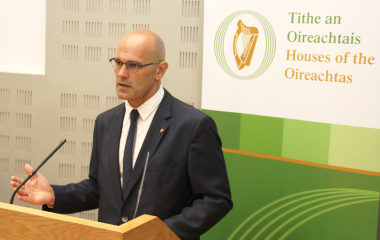- Upon invitation, the Minister of Foreign Affairs spoke in the Irish parliament on Wednesday to explain the political situation in Catalonia
- The address was given at the first session of the Catalonia discussion group created by Irish MPs and senators from the Fine Gael, Fianna Fáil and Sinn Féin parties
- Following the session, the Minister met with Sinn Féin leader Gerry Adams

On Wednesday, the Minister of Foreign Affairs, Institutional Relations and Transparency, Raül Romeva, travelled to Dublin to address the Houses of the Oireachtas for the first session of the parliamentary discussion group on Catalonia. The group was established by representatives of the main political parties in the Irish Assembly and Senate, Fine Gael, Fianna Fáil and Sinn Féin.
This was a closed session attended by MPs and senators from the aforementioned parties as well as by the Head of the Delegation of the Catalan Government to the United Kingdom and Ireland, Sergi Marcén.
In his address, the Minister highlighted the Government’s commitment to democracy and “to holding a referendum on independence”. “We have to respond to the 80% of the population who are demanding the vote”, he added. The Foreign Minister also referred to the offer of dialogue that President Puigdemont extended to the Spanish government on Monday, and noted that Catalan Executive “would like the referendum to be consensual, such as the one held in Scotland in 2014, and to be the result of an agreement between governments”. Furthermore, Romeva contended that it is necessary for “Spain to understand that the future of Catalonia will be decided democratically by the Catalan people”.
During his speech, the Minister expressed his concern about the “growing threat to democracy and the division of powers being witnessed in the Spanish State”. Romeva gave the example of the State’s demand to disbar the President of the Catalan Parliament, Carme Forcadell, who is being accused of disobedience, along with members of the bureau, for having allowed a debate on this issue in the Catalan legislate chamber. “When a party can use the law to alter the function of an institution such as the Constitutional Court to direct it against Catalan politicians, it opens up a door to these instruments being used against any other group in Spain, putting the entire democratic system at risk”, he affirmed.
Regarding the current European context, Minister Romeva recalled that new states have emerged, along with new joint initiatives, and that “everything has been incorporated with the pragmatic spirit of Europe”. He also referred to the relationships of some countries that today are being reconfigured as a result of Brexit, such as the United Kingdom and Northern Ireland. “Any democrat would agree that the future of Europe and its people must be defined from a standpoint of freedom, not imposition”, he noted. In this respect, Romeva explained the democratic right of the Catalan people “is a European issue, because the demand is formulated by European citizens; the majority just want to vote to decide their future”.
At the end of the conference, Minister Romeva met with Gerry Adams, the president of Sinn Féin, who gave his support, once again, to the Catalan political process.
The aim of the discussion group on Catalonia, the fifth to be created in Europe in the current legislature, is to forge bonds between Irish and Catalan MPs; to inform Ireland’s parliamentarians of the events taking place in Catalonia, and to ensure that discussions on the Catalan process are conducted with democratic guarantees.
This group strengthens bilateral relations between Ireland and Catalonia, facilitating and contributing to the international projection of Catalonia and its political process of self-determination. It also places a particular emphasis on trade relations between Ireland and Catalonia. At present, more than 500 companies in Catalonia export to Ireland on a regular basis.
Another objective of the discussion group on Catalonia is to promote the Catalan language and culture in Ireland, especially the teaching of Catalan. Currently, the University of Cork and the National University of Ireland in Dublin offer official Catalan courses and one of the group’s objectives is to make the course available to other educational centres.
Parliamentary groups on Catalonia in Europe
The creation of this group, supported by the Irish Parliament, joins similar initiatives that have been implemented in recent months around Europe. Estonia, Switzerland and Finland also have parliamentary groups to discuss the issue of Catalonia, with representatives from the main political parties. More recently, the Parliament of the United Kingdom officially recognised the creation of a cross-party group with representatives from parties in both the House of Commons and the House of Lords.
